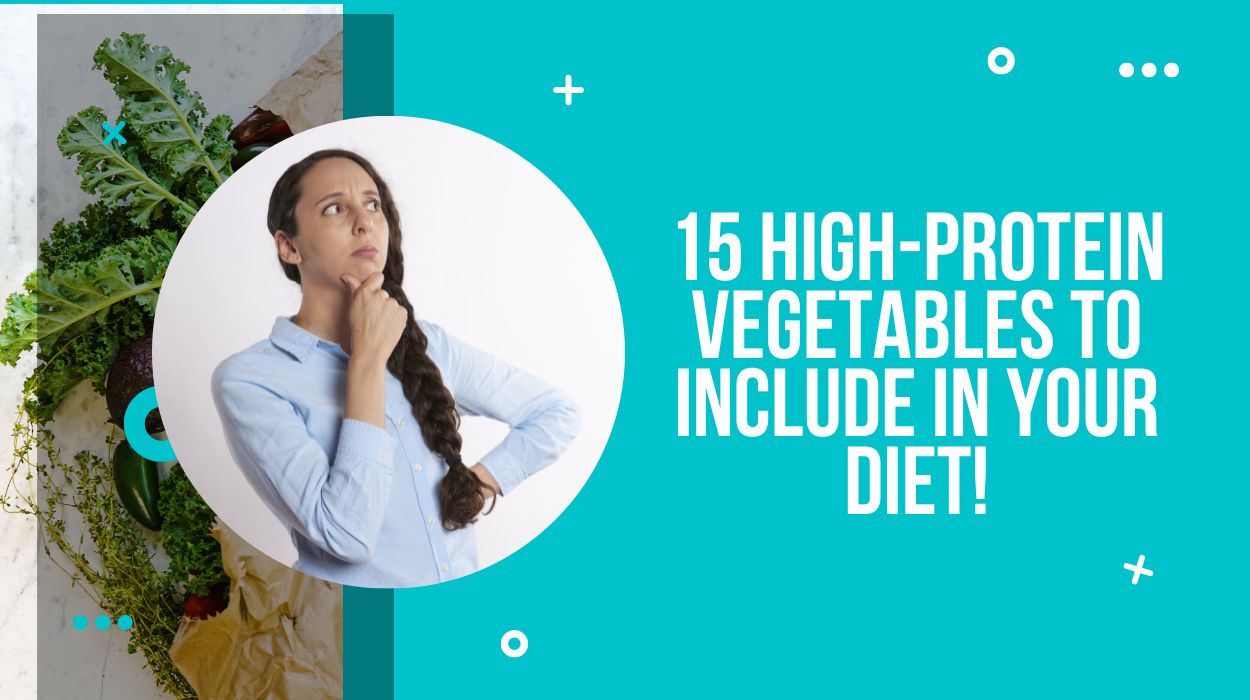Whether you desire to gain weight or shed those extra pounds off, protein plays a vital role in your weight gain or weight loss journey. It is required by our bodies to develop and repair tissues.
Moreover, a healthy diet is incomplete without proteins. Although meat and dairy products are the best sources of proteins, there are many protein-rich vegetables also to choose from.
So if you’re a vegetarian looking for plant-based alternatives of protein, then you have arrived at the right place. In this article, we’re going to tell you about 15 vegetables that are the best sources of protein.
So let’s begin!
15 Vegetables With Highest Protein
1. Broccoli
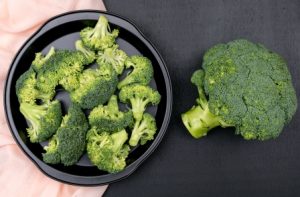
Broccoli is a vegetable of the cruciferous family. It is an excellent source of protein. It’s also high in fiber, antioxidants, phosphorus, and vitamin B9, among other nutrients.
Broccoli’s protein composition varies depending on whether it’s eaten raw or cooked, according to research.
You can add broccoli to your noodles, salads, and pasta, etc.
The protein content of broccoli is:
- 1 medium-sized boiled stalk of broccoli has g of protein.
- 1 cup of cooked broccoli has 5 g of protein
- 1 cup of raw broccoli contains 2.5 g of protein
2. Cauliflower
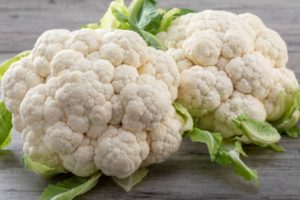
Cauliflower, like broccoli, is a cruciferous vegetable with high protein content. One cup of cauliflower contains 2 g of protein.
Its high amount of proteins make it a good substitute for meat for vegetarians. You can enjoy cauliflower in the form of curries, fried rice, and stir-fries, etc.
3. Asparagus
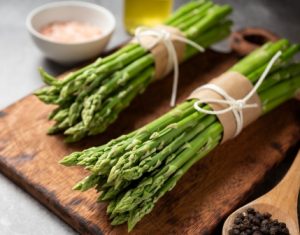
Asparagus is a vegetable incredibly high in protein. 1 cup of cooked asparagus contains 4.20 g of protein. It is also a good source of minerals and vitamins A, C, and K, etc.
You can either add asparagus to your diet in the form of salads, soups or enjoy it grilled or roasted, etc.
4. Spinach
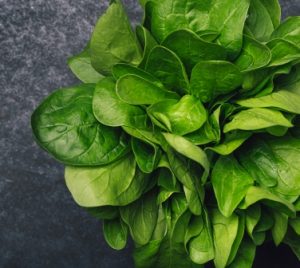
Spinach is a leafy green vegetable that is considered to be the best source of iron. But the health advantages don’t stop there! It is also a high-protein vegetable, with all essential amino acids present in its protein.
Spinach also contains a lot of nutrients, antioxidants, and vitamin A. You may use spinach in soups, curries, pasta, and other dishes.
1 cup of raw spinach contains 1 g of protein whereas, 1 cup of cooked spinach has 5-6 g of protein.
5. Watercress
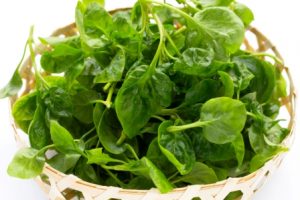
Watercress is an aquatic vegetable and also a member of the cruciferous family. It is a leafy green vegetable that is rich in proteins, vitamins, and minerals. 84% of its calories come from protein. 1 cup of watercress contains 0.7 g of protein.
You can simply add watercress in your soups, sandwiches, and salads or enjoy it with scrambled eggs.
6. Bok Choy Or Chinese Cabbage
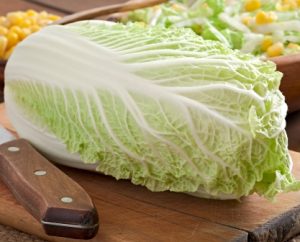
Chinese cabbage, often known as bok choy, is a high-protein vegetable. Protein provides for 46% of its calories. It also contains a good amount of vitamins K and E. You can include bok choy in your diet in the form of noodles, pasta, salads, and soups, etc.
The protein content of bok choy is:
- 1 cup of shredded bok choy contains 1.1 g of protein.
- 100 g of bok choy contains 1.5 g of protein
7. Brussels sprouts
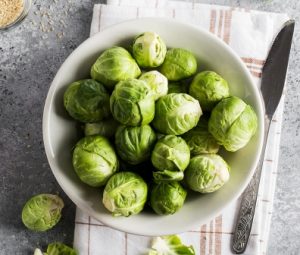
Brussel sprouts are vegetables that resemble little cabbages. They’re high in protein and can be consumed raw or cooked. Protein accounts for 31% of their calorie intake.
Brussel sprouts are best eaten raw, but they also taste great in salads. Folate, fiber, zinc, potassium, and vitamins A and K are all abundant in Brussels sprouts
The protein content of Brussels sprouts is:
- 1 cup of raw Brussels sprouts contains 3 g of protein.
- 1 cup of cooked Brussel sprouts contains 5.5 g of protein.
- 100 g of Brussels sprouts contains 3.4 g of protein.
8. Soya Bean Sprouts
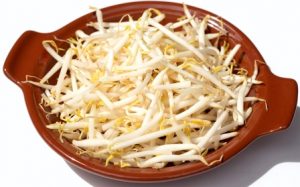
One of the most important sources of protein is soya bean sprouts. They have a nutty flavor and a crispy texture. They’re also high in fiber, magnesium, and vitamins C and K, etc.
The protein content of sprouts depends on whether you eat them raw or cooked. One cup of cooked sprouts contains 8 g of protein.
9. Green Peas
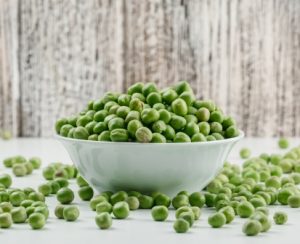
Although green peas come from a legume plant, they are mostly eaten as starchy vegetables. They are high-protein vegetables and one cup of raw green peas contains 4 g of protein.
They are also an excellent source of folate, fiber, and vitamins A and C. Peas are versatile and can be a tasty supplement to many recipes. The best part about green peas is that they can also be enjoyed raw.
10. White Mushrooms
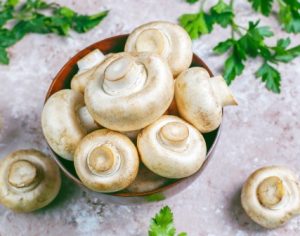
The earthy flavor of white mushrooms makes it the best alternative to meat. They are protein-rich vegetables and contain almost 38% protein of your daily diet. One cup of cooked white mushroom contains 4 g of protein.
In addition, mushrooms are also loaded with vitamin D. You can include them in your diet in the form of pasta, salads, soups or enjoy them grilled, etc.
11. Sweet Corn
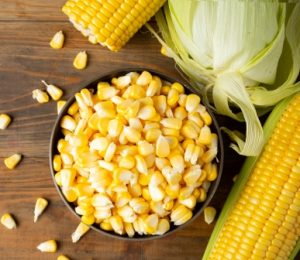
While there’s nothing more delicious than eating a sweet corn cob, what if we tell you that it can also boost your protein intake? Yes, you heard it right! One cup of boiled sweet corn contains 3.4 g of protein.
Not only sweet corn is rich in proteins, but it is also packed with antioxidants, fiber, folate, magnesium, and vitamin A, etc.
You can either enjoy boiled sweet corn kernels or add them to your pasta, rice, and soups, etc.
12. Green Beans
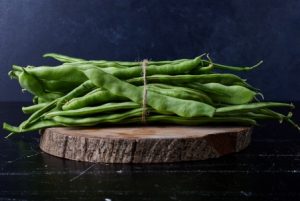
Green beans are a delicious veggie with a crispy texture. You can include them in your diet in the form of stir-fried, roasted, and fried rice, etc.
Green beans are high in protein. One cup of boiled green beans contains 1.9 grams of protein. In addition, they are also rich in fiber, antioxidants, iron, and vitamins A, C, and K.
13. Zucchini
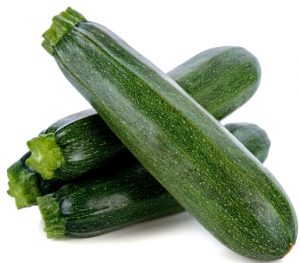
Zucchini is a kind of summer squash. It is a thin, long vegetable with dark green or yellow skin. It is high in protein and fiber. In addition, it is also packed with vitamins, minerals, and antioxidants. You can simply add zucchini to your pasta, fried rice, and salads, etc to reap its benefits.
The protein content of zucchini is:
- 1 large zucchini contains 3.9 g of proteins
- 1 cup of boiled zucchini contains 2.1 g of protein
14. White Potato
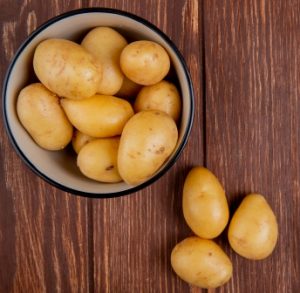
White potato is a starchy, root vegetable. It is a good source of protein. Moreover, it is also packed with carbs, minerals such as potassium, magnesium, and zinc, and vitamin C.
The protein content of potato is:
- 1 medium potato with skin has 3 g of protein
- 1 large baked potato has 7 g of protein
15. Kale
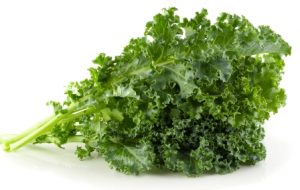
Kale is a leafy green vegetable that is an excellent source of protein but very low in calories. This means you can add it to your diet without worrying about weight gain. Voila!
One cup of boiled kale contains 2.5 g of protein.
In addition, it is also loaded with fiber and rich in vitamins A and C. You can add kale to your pizza toppings, soups, salads, and smoothies, etc.
FAQs
1. How much protein do I require daily?
According to studies, adults daily require 0.8 g of protein per kg of their body weight.
2. Which protein-rich vegetables can be a meat substitute?
Vegetables such as broccoli and spinach, for example, are good sources of protein and can help you achieve your daily protein requirements. Broccoli has more protein than steak, and spinach has the same amount of protein as fish and chicken.
You May Also Like To Read:
Foods That Have More Protein Than An Egg
The Difference Between Plant And Animal Protein
Conclusion
By now, we hope that you’re familiar with the various protein-rich vegetables. Consuming them regularly is the best way to boost the protein and nutritional quality of your diet without adding a lot of calories.
However, you need to keep in mind that the protein content of these vegetables depends on whether you cook them or enjoy them raw. So start including these veggies in your diet to remain fit and healthy!
If you have any further queries, please reach out to us in the comment section below. We will be happy to help you!

